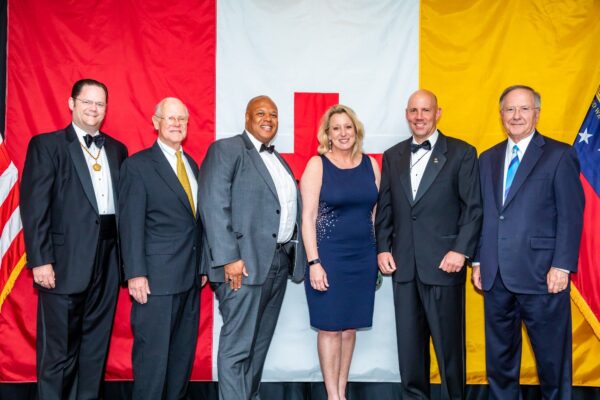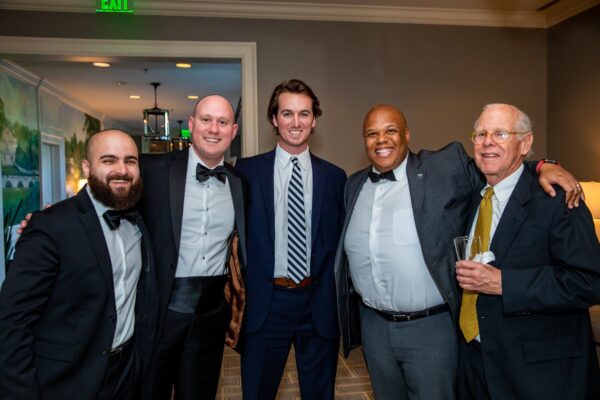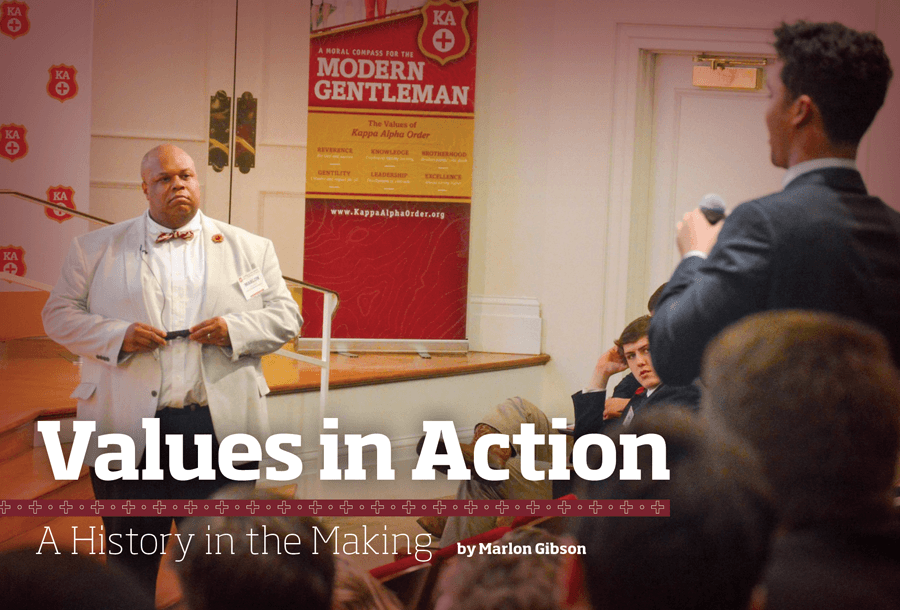
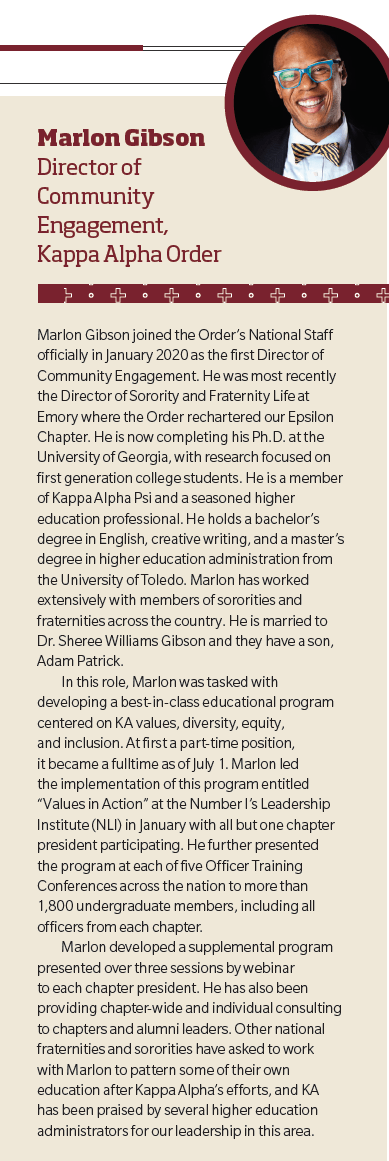 Editor’s Note: Marlon Gibson joined the KA national staff in January 2020, but his relationship with the Order has spanned several years. After KA and Marlon’s personal and professional paths crossed several times, yielding success at each turn, he was recruited to be the first Director of Community Engagement focused diversity, belonging, and inclusion, in context of on living KA values, and engaging in necessary conversations and actions. On these pages we share his thoughts, our progress, and results from participants from this important work.
Editor’s Note: Marlon Gibson joined the KA national staff in January 2020, but his relationship with the Order has spanned several years. After KA and Marlon’s personal and professional paths crossed several times, yielding success at each turn, he was recruited to be the first Director of Community Engagement focused diversity, belonging, and inclusion, in context of on living KA values, and engaging in necessary conversations and actions. On these pages we share his thoughts, our progress, and results from participants from this important work.
“The truth is: Belonging starts with self- acceptance. Your level of belonging, in fact, can never be greater than your level of self-acceptance, because believing that you’re enough is what gives you the courage to be authentic, vulnerable and imperfect.” – Brené Brown
When I accepted the opportunity of working for the Order at the beginning of 2020, I was honored to be the trailblazer chosen to lead KA in diversity, inclusion, belonging, and continued excellence. Today, I remain excited and humbled for the continued opportunity of working with all 125 of our Active Chapters, and more than 135,000 alumni worldwide. KA has a storied history like any fraternity founded in the late 1800s. The opportunity to work with an organization that remains true to its core values and yearning for opportunities to reconcile the past with that of today’s modern day moral compass in 2020 is an opportunity to engage multiple stakeholders in ways in which they have never been engaged in conversation and action.
I think back to my initial meeting with KA’s Executive Director, Larry Stanton Wiese, in April 2019 to discuss this project. Larry asked if I would be willing to create the curriculum for undergraduate members to better understand and be able to articulate the moral compass of a KA today. While KA has had much education in this area, and has made much progress organizationally, the fraternity wanted to continue the work for all members. Initially, I had to stop and think about the time commitment and also thinking through what it would mean to be the inaugural person to create this curriculum and lead it for an organization with more than 155 years of history. I came home that day, and had a conversation with my wife. We prayed over this opportunity and, at 6:05 a.m. the next morning, God spoke to us. He said that we were looking at this the wrong way—we needed to reframe this as an opportunity to impact a historic fraternity which has been around since 1865. We began thinking of ways to create the curriculum and make it engaging and exciting for today’s undergraduate members. I called Larry and said I would be delighted and honored to take on this project. Before I knew it, I had written and created the curriculum and I presented it to the staff at KA’s headquarters in Lexington, Virginia last July. The staff offered suggestions, I updated the program, and we had a plan. The idea was offered to to pilot this program at a couple of chapters before launching it at the Number I’s Leadership Institute in January 2020. In short time, I traveled and visited with the Chi Chapter at Vanderbilt, and the Alpha Upsilon Chapter at Ole Miss. The feedback, both anecdotal and concrete was encouraging—both chapters thoroughly enjoyed the program.
“Marlon has been vital to our education with several incredible, in-depth presentations to the Chapter that made us think differently and grow in our understanding of the importance of diversity and inclusion. Likewise, Marlon has been an incredible advocate for the Chapter in some of the most difficult situations by helping students, faculty, and staff to understand the Chapter’s perspective and begin conversations that could not have happened otherwise. Finally, and most importantly, he has been a friend to every brother of Beta Pi and that is something we will cherish forever.”
– Brent Glasgow, Number I (Beta Pi–Presbyterian ’17)
My next opportunity to impact and support one of our chapters was at Presbyterian College, in Clinton, South Carolina, home of the Beta Pi Chapter. I began working with the nine Chapter Officers, the “top nine” as I refer to them, during my first visit to the campus. I also had an opportunity of meeting with several members of Presbyterian’s upper administration, including the Chief Diversity Officer, the Vice President for Student Affairs, and then with the entire chapter. The chapter was and continues to be very welcoming of me and supportive of our work together. I feel like they have made me an honorary member of their chapter. Beta Pi continues to be a shining example of how collaboration, opportunity, and relationship-building are the key tenets of the work the Order is doing though this program. Together, we will continue to work through years of racial tension and misguided perceptions of the Beta Pi Chapter by the Presbyterian community. As we write the future story of Beta Pi, and other chapters within the Order, we continue to educate stakeholders about the KA of today.
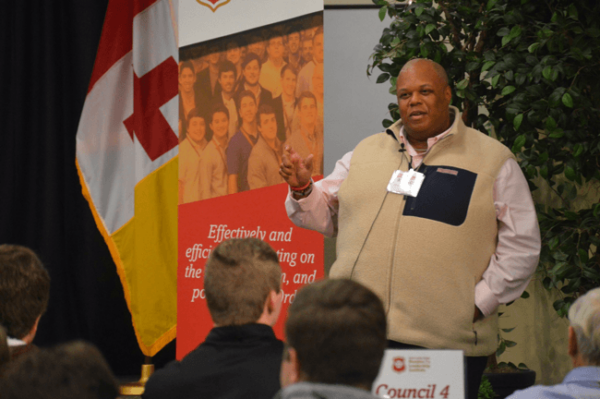
One of the ways I have educated our undergraduates and alumni is through my presentation at our Number I’s Leadership Institute, where all 125 chapter presidents had an opportunity of connecting with me. I also presented at our Officers Training Conferences during all five regional meetings. Each session was engaging, while also including time for role-playing and supporting students in asking me the “hard” questions and/or me role-playing the member of KA that has been called a “racist” or another person that is not inclusive of difference. I found each of these sessions to be the most engaging part of my presentations. I have also appreciated the invitations I have received from many leaders within the Order to come to their chapter and present while also engaging student leaders and staff on their respective campuses.
 Unfortunately, COVID-19 changed the course of those respective campus visits. However, I was able to conduct three webinars at varying times this past summer to honor different time zones and different schedules. In addition to the webinars I have responded to numerous texts, phone calls, Zoom meetings, and Google meetings, reaching nearly every chapter in the Order. I want to support and prepare our leaders and chapters so they are ready to face challenges and questions which may arise on social media and/or in person this summer, or as we prepare for an in person or virtual Fall semester.
Unfortunately, COVID-19 changed the course of those respective campus visits. However, I was able to conduct three webinars at varying times this past summer to honor different time zones and different schedules. In addition to the webinars I have responded to numerous texts, phone calls, Zoom meetings, and Google meetings, reaching nearly every chapter in the Order. I want to support and prepare our leaders and chapters so they are ready to face challenges and questions which may arise on social media and/or in person this summer, or as we prepare for an in person or virtual Fall semester.
One of the opportunities for the Order and its members to remain as leaders in these conversations is to listen, honor, respect, and learn from the varying points in which individuals may be sharing their feelings with our members. I know that myself and others are asking for the removal of racist systems not the removal of . This is an ongoing conversation I have with chapter leaders in asking them to focus on sustainable opportunities for KA to show up as being supportive today, tomorrow, and beyond. My hope is that campuses will see KA as supporting, walking, and leading with their peers in dismantling racist and oppressive systems on their campus and within their communities.
We must listen to the privileges, which are different perspectives, we have and to understand these we must listen to each other. If we don’t name our oppression, we can’t fight it. We have members within the Order that are just now learning about oppression, racism, and concept of privilege in our communities, and that is fine. I am thankful to start the conversation somewhere. I am humbled and honored to work with our undergraduates in navigating these conversations and opportunities for learning and growth. After all, Lee said, “The education of a man is never completed until he dies.”
One of my personal goals each day is honoring this quote, “Grace means that all of your mistakes now serve a purpose instead of serving shame.” When I am meeting with KAs across the country, I ask them to extend grace in situations where they may not feel like do so is an option. I am striving to help them to understand that we are all on this journey called life, and this is just one of the many ways to show people that we are modeling the way of living as today’s moral compass for the modern gentleman, on our campuses and within our respective communities. We also have conversations about what does it mean and how do we feel when our peers and family members don’t extend grace to us as human beings.
“Based on conversations with chapter leaders and advisors, the content was easy to understand and created an environment for members to gain knowledge no matter what their level of previous education on the topic. The chapter presidents and advisor raves about Marlon’s ability to connect with the chapter and have stated they can’t wait to have him back to work with the chapter.”
– Arthur E. Doctor, Jr. Ed.D. (Director of Fraternity & Sorority Life, University of Mississippi)
As I always say, there is no judgment, I am here to help, support, and make a difference within the Order, our campuses, and our communities. However, I know that I cannot do this alone, I always reach out to each chapter’s advisors and leadership team prior to my campus visit in order to prepare. In addition, I also reach out to campus colleagues to make sure that I am honoring and supporting them as a respective campus colleague.
While I’ve now personally presented to more than 1,800 members, and spoken with many more, I look forward to meeting as many KAs as possible around the country. I look forward to extending our conversations to make KA more visible as an organization that values inclusivity and differences, and to show the world that a KA man stands for the Order’s values of reverence, gentility, knowledge, leadership, brotherhood, and excellence.

